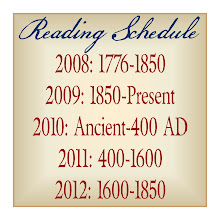Since this is such a classic story, I, as I'm sure you did, knew that Jekyll and Hyde were the same person, but it was interesting to read how it came about and how it was discovered by others. And I loved reading it the way it was written. There is something about the formal, classic, way that Stephenson writes that trumps all the versions of the story that I have heard and seen.
I also read Frankenstein with my kids this month (well the Children's Illustrated Classic version, anyway,) and in reading two "classic horror stories" I came to the conclusion that I didn't find them "horrific" as much as sad.
In the case of Jekyll and Hyde, I found it sad that selfishness can get people into so much trouble. Sad that the story had to end the way it did. Sad that man can be so prideful, that they have no one to turn to when they desperately need help. Sad that the one and only person Jekyll did confide in, didn't help, but instead chose to be appalled and reject him. Sad that people can fall so far through temptations.
When I first read Jekyll's letter to the Utterson, I couldn't believe the way that he described why he chose to continue to become Hyde. Such selfishness upset me. But after thinking about it for a little while, I realized how tempting that could be. I think, to a point, we do have two people inside of us. Who of us hasn't, at one time or another, felt a little rebellious, or angry, towards someone else? Most of us don't act on those urges because of the consequences that follow. But if you did have a disquise that would be impossible to track down, I think a lot of people would take advantage of the opportunity to release some anger, resentment, or revenge. How dangerous life would be if that was the case.
I liked the nature of the book, and the lessons I could take away from it. But in the end, I was especially glad it was fiction.
So what did you think?
(Poll for December's book is in the side bar. I decided to go with less "classic" and more "present" since this will be one of the last polls for the 1600-present time frame.)




